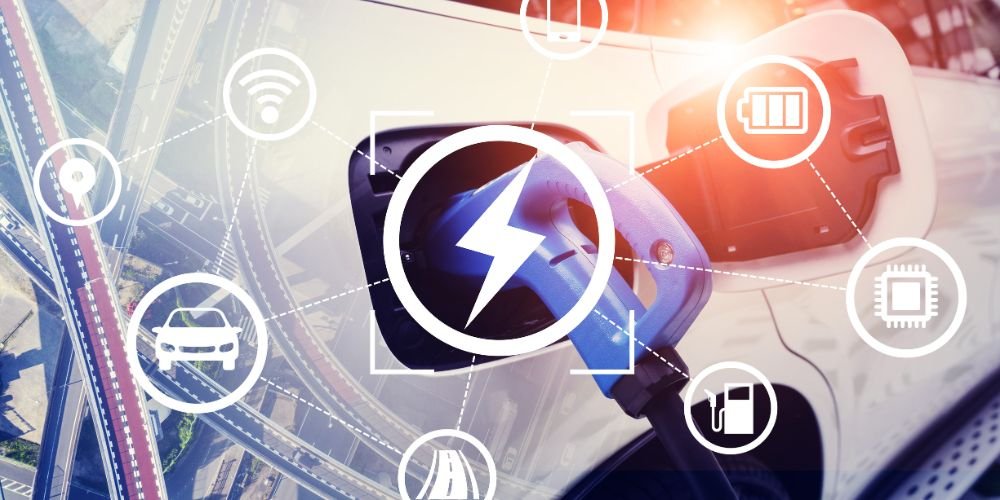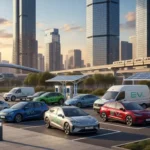In the age of environmental consciousness and technological innovation, electric vehicles (EVs) have emerged as a transformative force in the automotive industry. This article examines the historical evolution of electric vehicles, the technologies underlying their operation, their environmental impact, and their role in shaping the future of transportation.
Historical Evolution of Electric Vehicles
The concept of electric vehicles is not a recent development; it dates back to the early days of automotive history. In the 19th century, it rivaled its internal-combustion counterparts, with electric cars even holding the land-speed record in the early 20th century.
Early Challenges – The Rise and Fall
Despite early successes, electric vehicles faced challenges such as limited range, constraints in battery technology, and the appeal of mass production for gasoline-powered cars. The convenience of gasoline and the internal combustion engine’s effect led to the decline of electric vehicles in the early to mid-20th century.
Resurgence in the Late 20th Century – Environmental Awareness
In the late 20th century, we witnessed a resurgence of interest in electric vehicles, fueled by growing concerns about environmental pollution and the finite nature of fossil fuels. Innovations in battery technology, heightened environmental awareness, and advances in electric drivetrains have reignited the pursuit of electric mobility.
The Technology Behind Electric Vehicles
Electric vehicles rely on advanced technology to power their drivetrains and store energy for propulsion. Understanding the key components of this technology is essential to grasping its potential and limitations.
Electric Drivetrain – Powering the Wheels
The heart of an electric vehicle lies in its electric drivetrain, which replaces the traditional internal combustion engine. Electric motors convert electrical energy stored in the vehicle’s battery into mechanical energy, propelling the vehicle forward with instant torque and efficiency.
Battery Technology – Energy Storage Advancements
The development of high-performance batteries is a cornerstone of electric vehicle technology. With their high energy density and longevity, lithium-ion batteries have become the standard in electric vehicles. Ongoing research aims to improve battery performance, reduce costs, and enhance sustainability through recycling and the use of alternative materials.
Charging Infrastructure – Enabling Electric Mobility
The growth of electric vehicles relies on a robust charging infrastructure. Charging stations, ranging from slow-charging residential outlets to fast-charging public stations, form a network that supports the widespread adoption of electric mobility. Advances in charging technology, including fast chargers and wireless charging, continue to enhance the convenience of electric vehicle ownership.
Environmental Impact of Electric Vehicles
One of the primary drivers behind the adoption of electric vehicles is their potential to reduce the environmental impact of transportation. Understanding how electric vehicles contribute to sustainability is crucial for evaluating their role in combating climate change.
Zero Emissions – Cleaner Air and Lower Carbon Footprint
Electric vehicles produce zero tailpipe emissions, enhancing air quality in urban areas when charged with electricity from renewable sources. They also significantly offer a pathway to lower carbon emissions than traditional gasoline-powered vehicles.
Life Cycle Analysis – Evaluating Environmental Impact
A comprehensive assessment of the environmental impact of electric vehicles considers the entire life cycle, including manufacturing, use, and end-of-life phases. Life-cycle analysis indicates that it can have a lower overall environmental impact than conventional vehicles, despite initial manufacturing emissions, particularly as the energy grid becomes greener.
Sustainable Materials – Paving the Way for Eco-Friendly Manufacturing
The automotive industry is exploring sustainable materials for electric vehicle manufacturing to reduce environmental impact. From recycled plastics to plant-based materials, the quest for eco-friendly components aligns with the broader goal of making them more sustainable throughout their life cycle.
Market Growth and Adoption
The electric vehicle market has experienced significant evolution in recent years, driven by technological advances, environmental consciousness, and government incentives. Understanding the factors contributing to market growth is essential for anticipating the future trajectory of electric vehicles.
Government Incentives – Accelerating Adoption
Many governments worldwide offer inducements to encourage the adoption of electric vehicles. These incentives may include tax credits, rebates, and exemptions to promote electric vehicle ownership, reduce emissions, and stimulate growth in the electric vehicle market.
Advancements in Affordability – Closing the Price Gap
Electric vehicles have become more affordable as battery costs decline and economies of scale are realized. This trend has made them more accessible to a broader range of consumers, further driving market growth.
Diverse Vehicle Offerings – Catering to Consumer Preferences
The electric vehicle market now offers a diverse range of options, from compact city cars to SUVs and luxury vehicles. This diversity caters to different consumer preferences, contributing to the mainstream acceptance of electric vehicles as a viable alternative to traditional cars.
Challenges and Future Developments
While electric vehicles have made significant strides, challenges remain. Overcoming these challenges and anticipating future developments is crucial for realizing the full potential of electric mobility.
Charging Infrastructure Expansion – Meeting Growing Demand
A robust and widespread charging infrastructure is essential to accommodate the increasing number of electric vehicles on the road. Continued investment in charging stations, smart grid technology, and standardized charging protocols will address range anxiety and facilitate the seamless integration of electric vehicles into daily life.
Battery Technology Advancements – Extending Range and Longevity
Ongoing research and technological advances in battery technology aim to address limitations such as range anxiety and charging times. Advancements may include higher-energy-density batteries, rapid-charging capabilities, and improvements in battery recycling and sustainability.
Policy and Regulation – Shaping the Future
Governments play a pivotal role in shaping the future of electric mobility through policies and regulations. Continued support, including stricter emission standards, investment in charging infrastructure, and incentives for electric vehicle adoption, will be crucial to accelerating the transition to sustainable transportation.
Conclusion
Electric vehicles represent a paradigm shift in the automotive industry, offering a cleaner, more sustainable alternative to traditional gasoline-powered vehicles. From historical challenges to recent advancements, the journey of electric vehicles reflects a commitment to environmental stewardship and technological innovation. As the electric vehicle market continues to grow, supported by technological advancements and a shift in consumer preferences, the future of transportation appears increasingly electric, promising a cleaner and more sustainable way forward.





